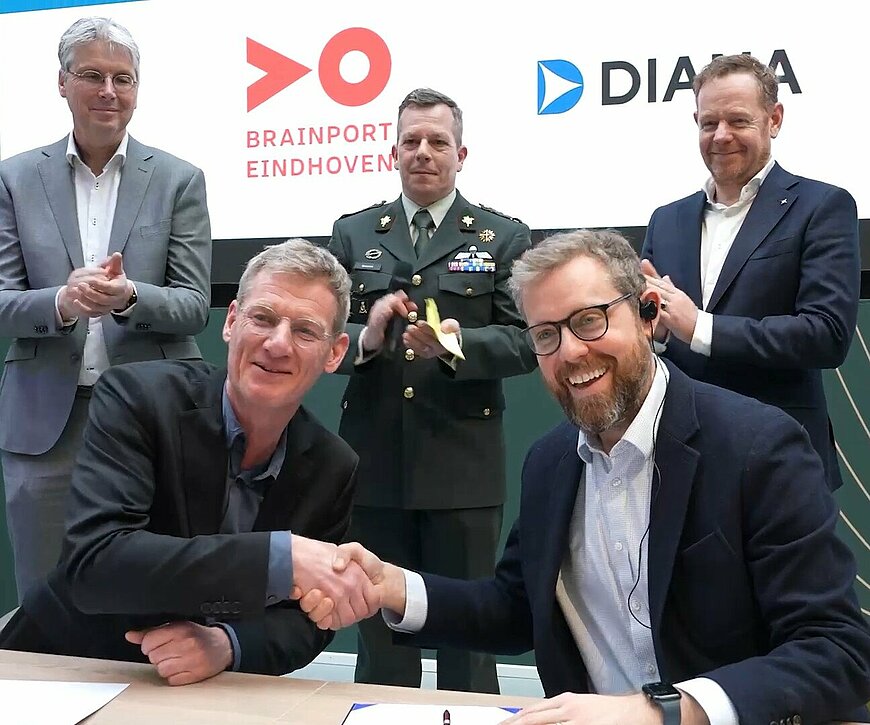Brainport region first in the Netherlands to join NATO's DIANA innovation accelerator

The Brainport region joined DIANA, a leading NATO innovation network, on February 28. On the recommendation of the Ministry of Defense, this step was taken in response to our strong cooperation in the field of top technology and innovation. This gives the Brainport region the scoop of being the first Dutch region to participate in this NATO initiative.
Brainport Eindhoven has been designated by NATO as the first Dutch region to receive the prestigious DIANA status, becoming a hub for defense innovation. Today, BITS (Brainport Innovation & Technology Security) celebrated its first year of existence. At the Brainport Industries Campus, the stakeholders looked back on one year of cooperation between defense and industry.
“This cooperation is intensifying within the context of shifting geopolitical power relations”, a spokesperson from the Brabant Investment Agency (BOM) commented. “Innovation is vital for defense to ensure strategic economy and economic security.” According to State Secretary Christophe van der Maat, also present at the ceremony, BITS is a blueprint for defense to innovate faster. “We improve our ability to innovate, our competitiveness, and our economy. And at the same time, we are strengthening NATO and thus our defense. This is a form of cooperation that I really believe in, and that benefits everyone.” Within the BITS consortium, Brainport Development, the Ministry of Defense, the Ministry of Economic Affairs and Climate, the Province of North Brabant, and the BOM are working together.
A €25 million fund – granted by the Dutch Ministry of Defense and managed by BOM – is a first step to providing venture capital to invest in these innovative startups. With a significant NATO investment of one billion euros, local enterprises are set to explore the convergence of civilian technology and military applications. This initiative not only brings technological advancements to the forefront of conflict prevention but also tackles global challenges like energy scarcity and climate change. The collaboration has already drawn in Dutch companies like Kitepower and Lobster Robotics, focusing on military uses for civilian products. As Brainport steps into this role, it sets a precedent for future partnerships in strengthening global security through innovation.
Innovation meets strategy
The Defence Innovation Accelerator for the North Atlantic, or DIANA, is an ambitious program that melds the peacekeeping aspirations of NATO with the technological prowess of the Brainport Eindhoven region. The program’s first round of challenges included developing undersea detection systems, surveillance enhancements, secure information sharing, and exploring new avenues in energy. These projects align with NATO’s strategic defense objectives, emphasizing the importance of innovation in maintaining a competitive edge in today’s shifting geopolitical landscape.
Companies within the Brainport ecosystem are encouraged to think beyond commercial applications, considering how their technological innovations could bolster military capabilities. The involvement of businesses like Kitepower, Lobster Robotics, and Ore Energy exemplifies this transition from civilian to defence-focused applications. Kitepower’s airborne wind energy systems, for instance, have the potential to provide mobile, renewable energy sources for military operations, addressing the strategic need for sustainable power solutions in the field.
The Brainport region’s selection as a DIANA accelerator within NATO’s network underscores the region’s technological capabilities and strategic importance within the alliance. This collaboration aims to ensure that the Netherlands, and particularly the Brainport region, maintains a leading position in defense technology, which is essential for economic and strategic security in the future.
Regulatory oversight and ethical considerations
With great power comes great responsibility, and the development of military technology is no exception. The ethical oversight of these innovations is a critical concern. The collaborative framework includes input from various ministries and regional bodies to ensure that the technological advancements are aligned with international standards. This multi-stakeholder approach balances innovation, strategic utility, and ethical consideration.
Moreover, projects like the partnership between the Royal Netherlands Air Force and various companies to improve the maintenance of the F35 fighter jet, or Signify’s exploration of LiFi communication for vehicles, demonstrate the commitment to a regulated development within the military context. The intent is to bind these projects, people, and knowledge together, creating a more effective and structured collaboration while adhering to international humanitarian law and ethical standards.
Creating a technological vanguard
The intent declaration signed by the Dutch Ministry of Defence and regional partners such as BOM and Brainport Development marks the beginning of a concerted effort to utilize South Netherlands’ technological strength for defense innovation. According to the consortium, the region aims to create a new technological edge, transforming defense into a modern, high-tech organization capable of fast, adaptable, and powerful responses based on the best information available.
This strategic cooperation within the Brainport region leverages a fertile environment ripe with technological development opportunities. For example, the Safety and Security Campus in Oirschot is a site where the defense, police, fire department, customs, and the local government collaborate on shared security concerns. These initiatives, bolstered by this new intent declaration, seek to enhance the synergy between projects, facilitating more effective partnerships.
